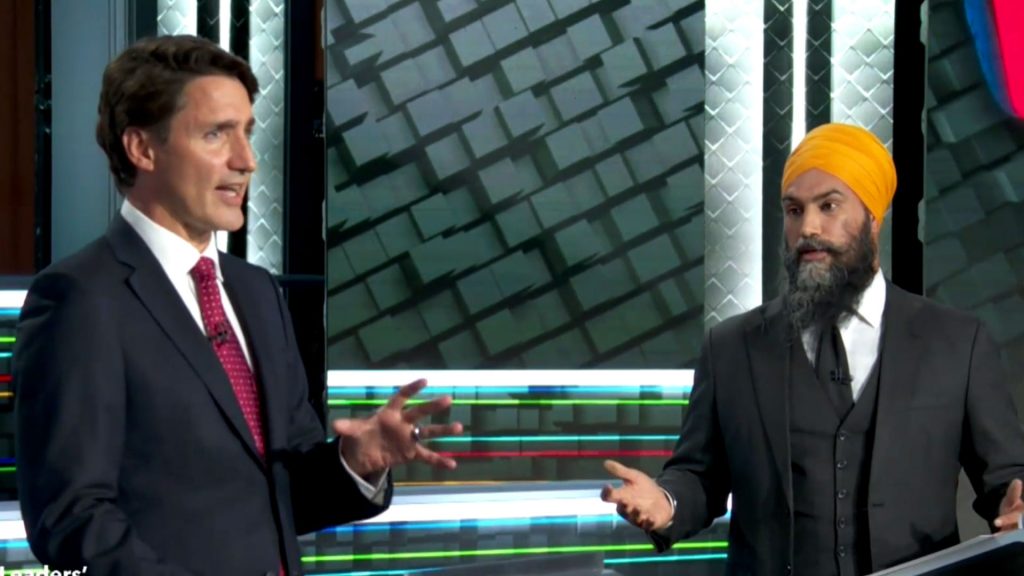
NDP Leader Jagmeet Singh and Prime Minister Justin Trudeau trade barbs during the 2021 leaders' debate. Photo: APTN
Assuming each party upholds its end of the bargain, the new Liberal-NDP alliance guarantees the Trudeau government four more budgets to pursue its reconciliation agenda, says Jaime Battiste.
That’s a good thing for Indigenous communities, the Mi’kmaw Liberal MP contends.
“We’re talking about four budgets that we’re looking at that can advance Indigenous issues, that can advance reconciliation, that can close the gap,” Battiste, who is the parliamentary secretary for Crown-Indigenous relations, told Nation to Nation on Thursday.
“We’re just finding common ground with the NDP in which we can ensure we’re taking the time we need to get things right,” he said.
Under the pact, called a “supply and confidence agreement,” the NDP agrees to back the Liberals on confidence votes like budgets. In exchange, the Liberals pledge to deliver on cornerstone NDP policies like public dental care and pharmacare.
The deal affords stability to invest in things like Indigenous housing and policing, as well as the time needed to deliver for people on the ground, Battiste said.
“This means we get to see the tangible results, not just the line items on a budget,” he added. “Working across the party lines with the NDP on this, I feel, gives us the opportunity to see these big promised items into fruition and reach the grassroots.”
Before the deal, NDP Leader Jagmeet Singh was one of Trudeau’s constant critics on Indigenous issues, frequently blasting him for failing to lift boil-water advisories and taking First Nations kids to court.
NDP MP Blake Desjarlais, who is Métis from Alberta, agreed the deal could have big impacts but expressed some regret it doesn’t contain more on reconciliation.
“If it was a New Democratic government we would definitely implement many more reconciliation items, but this is a Liberal minority government,” he told N2N. “We’re 25 members out of a 338-member House, and this is a significant deal for reconciliation that 25 members can get.”
Desjarlais said the pact’s top reconciliation item is a Liberal commitment to making the largest Indigenous housing boost ever seen, which won’t be controlled by government but communities themselves.
As the smaller party, he acknowledged the concord poses some risks for the NDP. But he said they’re risks worth taking to try and make policy gains.
“The Liberals are a big, giant machine. They’re a big machine that I don’t trust and many people don’t trust,” he said. “But the reality is they’re still in power, and we need to do what we can in order to get what’s right for Canadians.”
Watch the full interviews on N2N:
Indigenous Services Minister Patty Hajdu offered few specifics on the housing pledge on Friday, saying only that it’s “top of mind” right now for Finance Minister Chrystia Freeland.
Hajdu offered the remark at the House of Commons Indigenous affairs committee where she joined her cabinet colleagues Marc Miller and Dan Vandal to discuss their departments’ plan to spend $45.4 billion this fiscal year.
“I think we’re all waiting with bated breath for the budget,” said Hajdu. “Certainly, we know that as a government we must be more ambitious in our expenditures on affordable housing, in particular for First Nations, Inuit and Métis people.”
Indigenous Services has asked Parliament to approve $39.6 billion, which would make Hajdu’s department the top federal spender by an estimated $15 billion this year.
Crown Indigenous Relations and Northern Affairs, meanwhile, is seeking $5.8 billion. The combined total represents a 214 per cent increase from the Indigenous spend of five years ago, the parliamentary budget office said this month.
Nearly half of it, or $22 billion, would go toward out-of-court settlements, notably the resolution of lawsuits over the discriminatory underfunding of the on-reserve child-welfare system, the PBO reported.
Miller, in his prepared committee testimony, said cash compensation of this sort plays an essential role in “restorative and reparatory justice” that allows the parties to right wrongs and move forward.
“What may seem in appearance to be large sums are often sums that have been due over sometimes decades and indeed centuries,” he said.
The release date for the 2022 budget has not been announced.
Meanwhile, interim Conservative leader Candice Bergen has slammed the governance pact, saying it prioritizes “secret deal-making over parliamentary debate” and “opportunism over accountability.”
During Friday’s committee session, Hajdu and Miller’s strongest criticism came from Conservative MPs.
Jamie Schmale, Tory critic for Indigenous services, grilled Hajdu on her government’s failure to supply clean water to all First Nations by March 2021 — one of Trudeau’s key 2015 campaign pledges.
Hajdu refused to offer a new date for when the promise will be fulfilled, as did Battiste when asked on N2N.
“The investments are already there,” he said. “When communities who need to lift these boil-water advisories come to us with a plan, we will fund them.”












